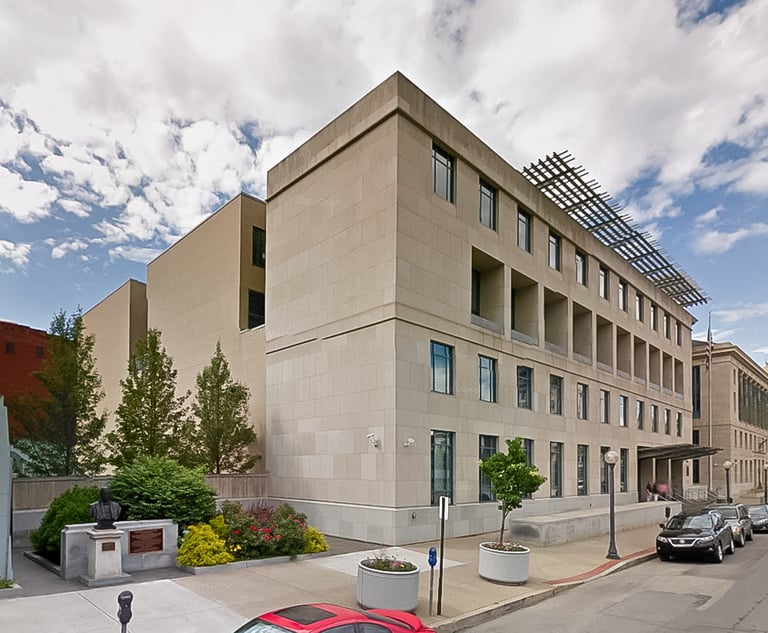UPDATED: Judge: School Cheerleader Can't Be Kicked Off Squad for Profane Snapchat Post
A high school cheerleader can't be kicked off the squad for creating a profanity-laden Snapchat post in front of a convenience store, a federal judge has ruled.
October 06, 2017 at 03:39 PM
3 minute read

A high school cheerleader can't be kicked off the squad for creating a profanity-laden Snapchat post in front of a convenience store, a federal judge has ruled.
The parents of the cheerleader, a sophomore at Mahanoy Area High School referred to in court papers as B.L., sued the district for punishing their daughter for private, out-of-school speech, and asked the court for an injunction.
B.L. was kicked off the squad after a coach found out that she and a friend posted a Snap of themselves holding up their middle fingers with a caption that read, “fuck school fuck softball fuck cheer fuck everything.”
According to U.S. District Judge A. Richard Caputo of the Middle District of Pennsylvania, B.L.'s parents were told by school officials that the district had the right to discipline students for “disrespecting the school” and that the school believed the Snap was demeaning to coaching staff.
However, Caputo said the case involved B.L.'s First Amendment right to expressive speech, and because it occurred outside of school, the district did not have the authority to remove her from an extracurricular activity.
Caputo cited the 2011 U.S. Court of Appeals for the Third Circuit case J.S. v. Blue Mountain School District, in which a high school student created an online profile accusing her principal of being a sex addict. Caputo noted the basics of the case were similar in that both involved a digital medium conveying speech that occurred outside of school grounds on a weekend, leading the Third Circuit to rule that the speech in Blue Mountain was protected.
“As such, the same rule that prevented the school district from levying punishment in Blue Mountain should be restated here: a student's potentially lewd or profane speech created off campus must not subject that student to punishment by a public school district,” Caputo said.
But the district argued that B.L.'s speech should be considered on campus, pointing to a Third Circuit decision, J.S. ex rel H.S. v. Bethlehem Area School District, that said internet speech could be “imported” onto school grounds if it was directed at [a] specific audience and was accessible on school property.”
Caputo said the district's reliance on that case was misplaced and doesn't comport with the court's 1986 ruling in Bethel School District No. 403 v. Fraser. In Fraser, the court held a school can only limit vulgar speech that is “reasonably expected to disrupt the school.”
“The Third Circuit has plainly stated that this case does not support the idea that profane speech created off campus can be 'imported' on campus to invoke Fraser,” Caputo said.
Molly Tack-Hooper of the American Civil Liberties Union of Pennsylvania represented the plaintiffs and did not respond to a request for comment. Nor did the district's attorney, David Brown of the Levin Legal Group.
P.J. D'Annunzio can be contacted at 215-557-2315 or [email protected]. Follow him on Twitter @PJDannunzioTLI.
This content has been archived. It is available through our partners, LexisNexis® and Bloomberg Law.
To view this content, please continue to their sites.
Not a Lexis Subscriber?
Subscribe Now
Not a Bloomberg Law Subscriber?
Subscribe Now
NOT FOR REPRINT
© 2025 ALM Global, LLC, All Rights Reserved. Request academic re-use from www.copyright.com. All other uses, submit a request to [email protected]. For more information visit Asset & Logo Licensing.
You Might Like
View All
Pa. Appeals Court: Trial Judge Dismissed Med Mal Claims Without Giving Plaintiffs Proper Time to Fight Back
4 minute read
Phila. Judge Upholds $68.5M Verdict Over Construction Worker's Death
3 minute read
Middle District of Pennsylvania's U.S. Attorney Announces Resignation
2 minute readTrending Stories
- 1Restoring Trust in the Courts Starts in New York
- 2'Pull Back the Curtain': Ex-NFL Players Seek Discovery in Lawsuit Over League's Disability Plan
- 3Tensions Run High at Final Hearing Before Manhattan Congestion Pricing Takes Effect
- 4Improper Removal to Fed. Court Leads to $100K Bill for Blue Cross Blue Shield
- 5Michael Halpern, Beloved Key West Attorney, Dies at 72
Who Got The Work
Michael G. Bongiorno, Andrew Scott Dulberg and Elizabeth E. Driscoll from Wilmer Cutler Pickering Hale and Dorr have stepped in to represent Symbotic Inc., an A.I.-enabled technology platform that focuses on increasing supply chain efficiency, and other defendants in a pending shareholder derivative lawsuit. The case, filed Oct. 2 in Massachusetts District Court by the Brown Law Firm on behalf of Stephen Austen, accuses certain officers and directors of misleading investors in regard to Symbotic's potential for margin growth by failing to disclose that the company was not equipped to timely deploy its systems or manage expenses through project delays. The case, assigned to U.S. District Judge Nathaniel M. Gorton, is 1:24-cv-12522, Austen v. Cohen et al.
Who Got The Work
Edmund Polubinski and Marie Killmond of Davis Polk & Wardwell have entered appearances for data platform software development company MongoDB and other defendants in a pending shareholder derivative lawsuit. The action, filed Oct. 7 in New York Southern District Court by the Brown Law Firm, accuses the company's directors and/or officers of falsely expressing confidence in the company’s restructuring of its sales incentive plan and downplaying the severity of decreases in its upfront commitments. The case is 1:24-cv-07594, Roy v. Ittycheria et al.
Who Got The Work
Amy O. Bruchs and Kurt F. Ellison of Michael Best & Friedrich have entered appearances for Epic Systems Corp. in a pending employment discrimination lawsuit. The suit was filed Sept. 7 in Wisconsin Western District Court by Levine Eisberner LLC and Siri & Glimstad on behalf of a project manager who claims that he was wrongfully terminated after applying for a religious exemption to the defendant's COVID-19 vaccine mandate. The case, assigned to U.S. Magistrate Judge Anita Marie Boor, is 3:24-cv-00630, Secker, Nathan v. Epic Systems Corporation.
Who Got The Work
David X. Sullivan, Thomas J. Finn and Gregory A. Hall from McCarter & English have entered appearances for Sunrun Installation Services in a pending civil rights lawsuit. The complaint was filed Sept. 4 in Connecticut District Court by attorney Robert M. Berke on behalf of former employee George Edward Steins, who was arrested and charged with employing an unregistered home improvement salesperson. The complaint alleges that had Sunrun informed the Connecticut Department of Consumer Protection that the plaintiff's employment had ended in 2017 and that he no longer held Sunrun's home improvement contractor license, he would not have been hit with charges, which were dismissed in May 2024. The case, assigned to U.S. District Judge Jeffrey A. Meyer, is 3:24-cv-01423, Steins v. Sunrun, Inc. et al.
Who Got The Work
Greenberg Traurig shareholder Joshua L. Raskin has entered an appearance for boohoo.com UK Ltd. in a pending patent infringement lawsuit. The suit, filed Sept. 3 in Texas Eastern District Court by Rozier Hardt McDonough on behalf of Alto Dynamics, asserts five patents related to an online shopping platform. The case, assigned to U.S. District Judge Rodney Gilstrap, is 2:24-cv-00719, Alto Dynamics, LLC v. boohoo.com UK Limited.
Featured Firms
Law Offices of Gary Martin Hays & Associates, P.C.
(470) 294-1674
Law Offices of Mark E. Salomone
(857) 444-6468
Smith & Hassler
(713) 739-1250






